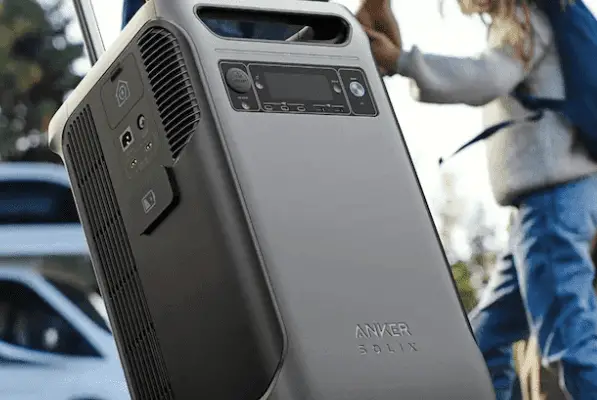Solar generators are becoming increasingly popular as an eco-friendly alternative to traditional power sources. These generators use photovoltaic panels to convert sunlight into electricity, providing a renewable and sustainable energy solution. As concerns about climate change and environmental degradation grow, many individuals and businesses are looking for ways to reduce their carbon footprint. Solar generators offer a practical and effective means to achieve this goal. This article explores the environmental benefits of using best solar generators, detailing how they work, their advantages over traditional generators, and why they are a wise investment for the future.
How Do Solar Generators Work?
Solar generators harness energy from the sun using photovoltaic (PV) panels. These panels consist of numerous solar cells made from semiconductor materials, typically silicon. When sunlight hits the solar cells, it excites the electrons in the semiconductor, generating direct current (DC) electricity. This DC electricity is then converted into alternating current (AC) electricity using an inverter, making it suitable for powering household appliances and electronics.
Solar generators typically include:
– Solar Panels: Capture sunlight and convert it into electricity.
– Charge Controller: Regulates the flow of electricity to the battery, preventing overcharging.
– Battery Storage: Stores the generated electricity for use when the sun isn’t shining.
– Inverter: Converts DC electricity from the battery to AC electricity for use in standard electrical devices.
Using a solar generator is straightforward. Set up the solar panels in a sunny location, connect them to the generator, and let the system charge. Once the battery is charged, the generator is ready to provide clean, renewable energy.
What Are the Environmental Benefits of Solar Generators?
Reduction in Carbon Footprint
Using solar generators significantly reduces carbon emissions. Traditional generators rely on fossil fuels, which release harmful greenhouse gases like carbon dioxide (CO2) into the atmosphere. These emissions contribute to global warming and climate change. In contrast, solar generators produce electricity without emitting CO2. According to the U.S. Environmental Protection Agency (EPA), switching to solar energy can prevent the release of several tons of CO2 annually. This reduction in carbon footprint is crucial for mitigating the adverse effects of climate change and promoting a healthier environment.
Decrease in Fossil Fuel Dependence
Solar generators help decrease our reliance on fossil fuels. Fossil fuels, such as coal, oil, and natural gas, are finite resources with significant environmental impacts. Their extraction and use lead to air and water pollution, habitat destruction, and greenhouse gas emissions. By using solar generators, we can tap into an abundant, renewable energy source—the sun. This shift not only conserves fossil fuels but also reduces the negative environmental consequences associated with their use. Solar energy is sustainable and inexhaustible, offering a long-term solution to our energy needs.
How Do Solar Generators Compare to Traditional Generators?
When comparing solar generators to traditional generators, several key differences emerge:
– Environmental Impact: Solar generators have a minimal environmental footprint, producing clean energy without emissions. Traditional generators burn fossil fuels, releasing harmful pollutants.
– Noise Pollution: Solar generators operate silently, while traditional generators can be noisy and disruptive.
– Fuel Cost: Solar energy is free once the initial investment in equipment is made. Traditional generators require ongoing fuel purchases, which can be costly.
– Maintenance: Solar generators have fewer moving parts and require less maintenance than traditional generators, which need regular servicing and fuel management.
– Reliability: Solar generators depend on sunlight, which can be inconsistent. However, advancements in battery storage and hybrid systems help mitigate this issue. Traditional generators provide consistent power but at the expense of environmental impact and fuel costs.
Overall, solar generators offer a cleaner, quieter, and more cost-effective solution, especially for those committed to reducing their environmental footprint.
Why Should You Consider Switching to Solar Generators?
There are several compelling reasons to switch to solar generators:
– Environmental Responsibility: By using solar generators, you contribute to a cleaner, healthier planet.
– Cost Savings: After the initial investment, solar generators provide free energy, reducing your electricity bills.
– Energy Independence: Solar generators offer a reliable power source, especially in remote areas or during power outages.
– Government Incentives: Many governments offer tax credits, rebates, and incentives for adopting solar technology, making it more affordable.
– Technological Advancements: Continuous improvements in solar technology enhance efficiency and affordability, making it an increasingly attractive option.
Switching to solar generators is a smart choice for those looking to save money, gain energy independence, and protect the environment.
Conclusion
Solar generators present a viable solution to our energy needs while promoting environmental sustainability. They offer numerous benefits, including reduced carbon emissions, decreased reliance on fossil fuels, and cost savings. As technology advances and awareness of environmental issues grows, solar generators are poised to become a key component of our energy infrastructure. Making the switch to solar energy is not only a responsible choice but also a forward-thinking investment in a cleaner, greener future.
FAQs
Are solar generators cost-effective in the long run?
Yes, solar generators are cost-effective over time. The initial investment is offset by savings on fuel and maintenance, along with potential government incentives.
How reliable are solar generators in different weather conditions?
Solar generators are reliable but depend on sunlight. Advances in battery storage and hybrid systems help ensure consistent power, even during cloudy or rainy weather.
Can solar generators power a whole house?
Yes, solar generators can power a whole house, especially when paired with adequate battery storage. The capacity depends on the system size and energy consumption.



